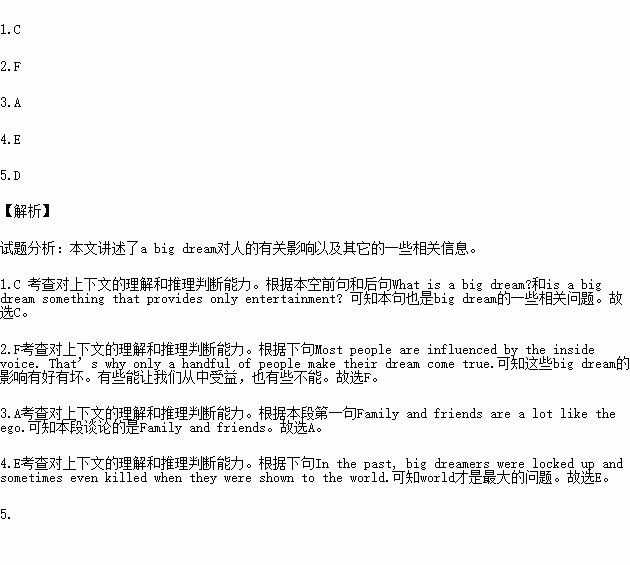题目内容
根据短文内容,从短文后的选项中选出能填入空白处的最佳选项。选项中的两项为多途选项。
What is a big dream ? 1.________ Or , is a big dream something that provides only entertainment? Children dream big dreams, but there are three barriers to realizing dreams. They often kill them before they ever have a chance to grow.
The Self
Immediately following the birth of a big dream, a negative self-talk takes over and gives all the reasons why it cannot happen. This inside voice is the ego(自我). It’s there for protecting and should be listened to. 2.________ Most people are influenced by the inside voice. That’s why only a handful of people make their dream come true.
3.________
Family and friends are a lot like the ego. They want to protect those they love, so they will often list all the reasons why the big dreams won’t come true. Sometimes, family and friends destroy dreams of those they love most, out of their own fear of being left behind.
The World
If one gets past the first two barriers, one has to face the world. 4. ________ In the past, big dreamers were locked up and sometimes even killed when they were shown to the world. Fortunately, in most of the world today, big dreamers just get laughed at.
The way to realize a big dream is with confidence and action. When children have confidence and then take action, they will be ready to accept any failure. The truth is that every great dreamer whose dreams have never seen the light of success knows failure well.
5.________
A. Family and Friends
B. How Big Dreams Die
C. Does a big dream show one’s future ?
D. They simply fail until they succeed.
E. It is the last and the most terrible barrier.
F. Sometimes it is right, but more often it is wrong。
G. And their big dream is to be a rock star or a famous artist.





